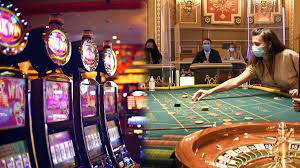Casinos, as we know them today, are sophisticated establishments where https://en-casino.com people can enjoy a variety of games of chance and skill. However, the concept of gambling and casinos has a long and fascinating history that stretches back thousands of years. This article explores the evolution of casinos, tracing their origins from ancient gaming practices to the contemporary, high-tech entertainment hubs of today.
Ancient Beginnings
The origins of gambling can be traced back to ancient civilizations. The earliest known evidence of gambling dates to around 2300 B.C. in ancient China, where rudimentary dice games were played. Similarly, ancient Egyptian records reveal that dice games were popular among the pharaohs and their subjects.
In ancient Rome, gambling was a popular pastime among the citizens. Roman emperors often organized games and betting events for entertainment purposes. These early forms of gambling were quite different from modern casinos but laid the groundwork for the social and cultural importance of gambling.
The Birth of Modern Casinos
The term “casino” originates from the Italian word for “little house” or “villa.” The first use of the term in the context of gambling dates back to the 17th century in Italy. The first modern casino, known as the Casino di Venezia, was established in Venice in 1638. It was initially designed to provide a controlled environment for gambling, separate from other social activities.
The concept of the casino quickly spread across Europe, with notable establishments emerging in cities such as Paris and Monte Carlo. The Casino de Monte-Carlo, opened in 1863, became famous for its opulence and for attracting wealthy patrons from around the world. This period marked the beginning of casinos as luxurious and glamorous venues.
The American Casino Boom
The arrival of casinos in the United States can be traced back to the late 19th century. Initially, gambling was legal in several states, and various forms of gaming were popular in saloons and private clubs. However, the real casino boom in America began in the 20th century.
Las Vegas, Nevada, became synonymous with casinos and gambling in the mid-20th century. The legalization of casino gambling in Nevada in 1931 set the stage for the rapid development of Las Vegas as a gambling and entertainment hub. The city’s casinos evolved from simple establishments into grand resorts featuring elaborate shows, luxurious accommodations, and a wide range of gaming options.
The Digital Age
The late 20th and early 21st centuries brought significant changes to the casino industry with the advent of online gaming. The first online casino was established in 1994, marking the beginning of a new era in gambling. Online casinos allowed players to enjoy casino games from the comfort of their own homes and led to the development of a vast digital gambling industry.
The integration of technology into casinos has also led to innovations such as electronic gaming machines, virtual reality casinos, and mobile gaming apps. These advancements have transformed the casino experience, making it more accessible and immersive than ever before.
Conclusion
From its ancient origins to its modern manifestations, the casino industry has undergone significant transformations. What started as simple games of chance in ancient civilizations has evolved into a global phenomenon characterized by luxury, entertainment, and technological innovation. As the casino industry continues to adapt to new trends and technologies, it remains a testament to humanity’s enduring fascination with games of chance and the pursuit of excitement.


